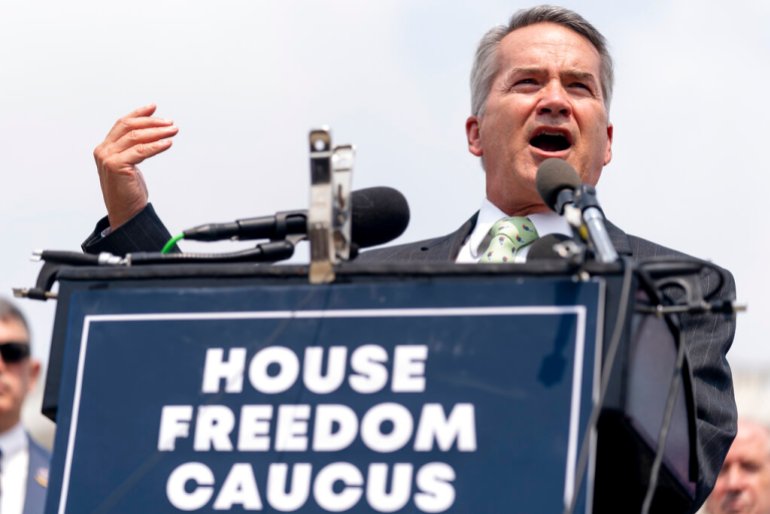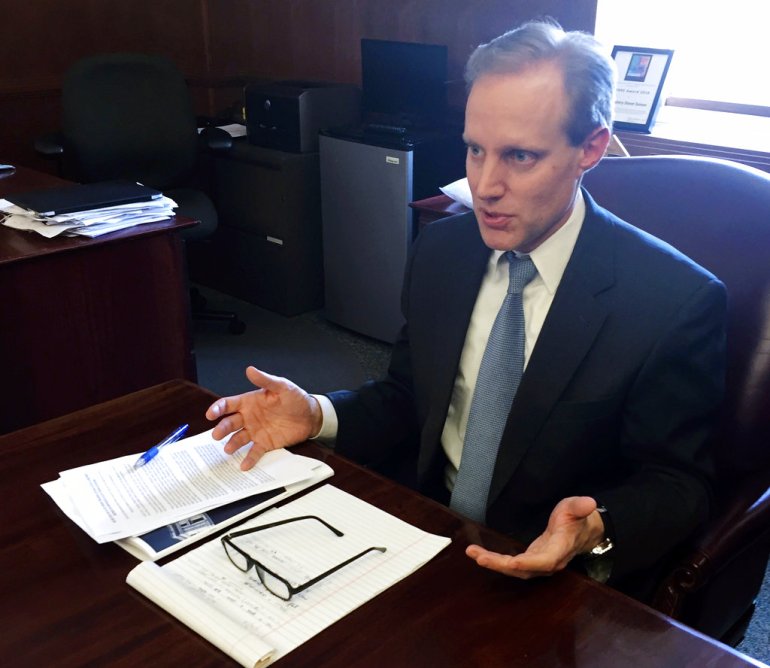US primaries: Why secretary of state races matter more than ever
If Trump-endorsed ‘election deniers’ win this office, they could put democratic voting process in jeopardy, experts say.

Washington, DC – It wasn’t the highest-profile race in last week’s US primary elections, but experts have said it was one of the most significant.
Brad Raffensperger, the Georgia secretary of state who grabbed national attention by clashing publicly with former President Donald Trump, beat Representative Jody Hice in the Republican primary by a resounding margin – 52 percent to 33 percent.
Keep reading
list of 4 itemsTrump pays $110,000 fine for failure to cooperate with NY probe
US judge dismisses Trump lawsuit, allowing New York investigation
Former Trump aide appears before US House probe of January 6 riot
Raffensperger drew Trump’s scorn in January 2021 after refusing his request to “find 11,780 votes” to overturn President Joe Biden’s victory in Georgia. Trump subsequently endorsed the candidacy of Hice, who voted against certifying the 2020 election results and spread unfounded accusations of voter fraud.
Raffensperger’s primary victory sends a “really important message”, David Becker, executive director of the nonpartisan Center for Election Innovation and Research, told Al Jazeera. “He wasn’t going to be bullied.”

Raffensperger still has to beat a Democrat in the November general election to keep his office.
Up until recently, localised campaigns for secretaries of state have often been overlooked in the United States. But these votes are critically important, as the secretary of state is responsible for overseeing the statewide electoral process, including the certification of results.
After the bitterly contested 2020 election, some secretaries of state have found themselves facing challenges at the ballot box from opponents who played a role in sowing doubts about the legitimacy of Biden’s victory.
According to States United Action, an organisation that advocates for free and fair elections, at least 23 Republican “election deniers” are running for secretary of state in 18 states.
“It is very troublesome if they are elected,” former New Jersey governor Christine Todd Whitman, who co-chairs the group, told Al Jazeera. “We have to keep pushing so people understand. People who don’t believe in the truth of our elections should not be trusted … [Their victory] could lead to a great amount of instability.”
‘Chaos and confusion’
Out of 27 secretary of state races slated for this November, more than half include incumbents running for re-election. “These elections matter,” Whitman said. “We want to make sure [people know] how important these elections are.”
Democrat Steve Simon, Minnesota’s secretary of state who is running for re-election, said the most important quality for the role was fairness and neutrality, “not being concerned about winners or losers”.
“It will fray democracy if you have people in charge of elections that have a particular outcome in mind,” Simon told Al Jazeera.
Kim Crockett, his Republican-endorsed challenger for the general election, has falsely stated that the 2020 election was rigged. She did not respond to messages seeking comment.
Becker agreed on the vital importance of the secretary of state races, noting that election deniers in this context “could create chaos and confusion, not only before an election happens but after an election happens”.

According to a report from the left-leaning Brennan Center for Justice, there has been a marked increase in donations for candidates running for secretary of state in key battleground states this year.
“Money is flowing into secretary of state races at a rate not seen in recent memory,” the report states, noting that donations have more than doubled since the same time in the 2018 election cycle. In some cases, election deniers have the fundraising edge, while in others, candidates who have condemned election denial are drawing more donations.
And election deniers are not just targeting secretary of state races. According to States United, at least 50 election deniers are running for governor across 24 states, and at least 15 for attorney general.
Trump has endorsed many of these candidates, some in battleground states, as he continues to peddle claims of election fraud. At least four election deniers, including Hice, have been defeated in primaries thus far.
Whitman said it is ironic that much of the attention on secretaries of state stems from the allegations about the 2020 presidential election, which “was not only free but fair and accurate” – a remarkable achievement in the middle of a global pandemic. “Republicans and Democrats … stood up for the Constitution and refused to bow to the pressure,” she said.
Indeed, there was intense pressure as secretaries of state and other election officials across the country faced threats and intimidation from Trump supporters. But this “alarming extremism” has not deterred Simon from the campaign: “It convinces me it’s more important.”
This article was updated to reflect that the research on “election deniers” done by States United Action and not States United Democracy Center.